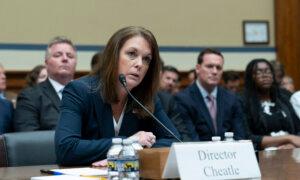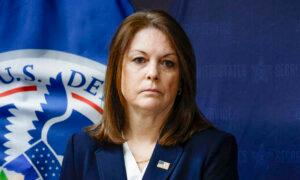The director is facing bipartisan calls to step down in the wake of the assassination attempt.
WASHINGTON—The House Oversight Committee kicked off its investigation of the attempted assassination of former President Donald Trump on July 22 by demanding answers from U.S. Secret Service Director Kimberly Cheatle.
Ms. Cheatle declined to provide the committee with some key details as to how suspected shooter Thomas Matthew Crooks, 20, of Bethel Park, Pennsylvania, managed to come close to a kill shot on a former president before being killed by a Secret Service sharpshooter.
The director, however, did confirm certain details on the day, including when the gunman was deemed a “threat” by agency personnel.
She also rebuffed growing bipartisan calls to resign.
Here are the key takeaways from the hearing.
Cheatle Admits Failure
The shooting at a Butler, Pennsylvania, rally claimed the life of one attendee and injured several others, including former President Trump, who miraculously only sustained a minor injury to his right ear.
Describing the incident as “the most significant operational failure of the Secret Service in decades,” Ms. Cheatle began her testimony by accepting full responsibility for the security lapses that allowed it to occur.
“The Secret Service’s solemn mission is to protect our nation’s leaders. On July 13, we failed,” she said, vowing to “move heaven and earth” to ensure such an attack never happens again.
It’s a message Ms. Cheatle was forced to repeat several times throughout the hearing as members questioned her over the severity of her agency’s security failures.
Bipartisan Calls to Resign
As both Republican and Democrat committee members peppered Ms. Cheatle with questions, a commonly expressed call was for her to step down.
“If you have an assassination attempt on a president or a candidate, you need to resign,” Rep. Ro Khanna (D-Calif.) said. As precedent, he pointed to the 1981 resignation of Secret Service Director Stuart Knight after the assassination attempt against President Ronald Reagan.
Ms. Cheatle told the committee that she had no intention of resigning.
“I think I am the best person to lead the Secret Service at this time,” she said at one point.
The committee’s bipartisan leadership disagreed.
“In the middle of a presidential election, the Committee and the American people demand serious institutional accountability and transparency that you are not providing,” the congressmen wrote.
“We call on you to resign as Director as a first step to allowing new leadership to swiftly address this crisis and rebuild the trust of a truly concerned Congress and the American people.”
Democrats Focus on Gun Control
Even with both sides calling on Ms. Cheatle to step down, there was a clear difference in how Democrat and Republican members approached the hearing.
While Republicans primarily sought answers as to how the events of July 13 were made possible, several committee Democrats focused their statements on gun control.
Mr. Raskin, for example, highlighted the fact that a controversial tracing system enabled law enforcement to identify the gunman by his AR-15 rifle’s serial number.
“Millions and millions of Americans don’t feel safe with all the AR-15s out there,” he said. “We thought at least the president of the United States or a former president of the United States would be safe, but now that’s not even clear.”
Meanwhile, Reps. Gerry Connolly (D-Va.) and Eleanor Holmes Norton (D-DC) raised similar concerns that the “ubiquity of guns” in the United States and Republican policies were making the Secret Service’s job more difficult.
“For years, Republicans, including a member of this committee, have introduced legislation and amendments to repeal or block the District of Columbia gun violence protection laws, including its bans on assault weapons and large capacity magazines,” Ms. Norton said.
Pointing to House Republicans’ 2025 appropriations bill for the federal government, the congresswoman noted that the bill would allow anyone with a state-issued permit to carry a concealed firearm to do so in Washington as well.
“Would Secret Service protectees in DC be safer or less safe if people in DC could carry concealed handguns with large capacity magazines?” she asked Ms. Cheatle.
The director replied that the Secret Service considers states’ various gun laws when mapping out security plans.
Cheatle Declines to Answer Key Questions
Ms. Cheatle received plenty of criticism from committee members for not providing more details about the Secret Service’s activities before and during the shooting, as well as the ongoing investigation into Thomas Matthew Crooks and his motivations.
During questioning by Rep. Marjorie Taylor Greene (R-Ga.), Ms. Cheatle was asked to provide a timeline of events regarding the shooting that detailed actions taken by the Secret Service by the minute. In response, Ms. Cheatle admitted that she could only offer “a timeline that does not have specifics,” which drew gasps from members.
“That is absolutely unacceptable,” Ms. Green responded.
Ms. Cheatle repeatedly declined to publicly share the names of agents who were involved in protecting the rally on July 13. She also refused to comment on specific details about the shooter, which she attributed to the FBI’s ongoing investigation of the matter.
Director Confirms Certain Details
Ms. Cheatle, responding to questions from committee members, revealed and confirmed certain details about the shooter that had been reported ahead of her testimony. She admitted that the shooter had a rangefinder—a mounted scope on top of the rifle he was using—that was not deemed suspicious by the Secret Service ahead of his intrusion. Ms. Cheatle noted that a rangefinder would not ordinarily be prohibited by the Secret Service at security checkpoints to enter political rallies.
Many members inquired exactly when the shooter had been identified as “suspicious” by the Secret Service before he fired the shots.
Ms. Cheatle confirmed that the shooter had been deemed suspicious by agents at least 20 minutes before the shots were fired at 6:11 p.m. She clarified that a suspicious person was not automatically regarded as a “threat” at events.
Rep. Russell Fry (R-S.C.) asked when former President Trump’s would-be assassin was officially deemed a threat by authorities on the scene.
Ms. Cheatle answered that she believed it was just “seconds before the gunfire started.”
Agents were notified of “an issue being worked” about five minutes before, however, she said.
Secret Service Investigates Apparent Communications Breakdown
Many members questioned Ms. Cheatle as to why the Secret Service did not communicate the shooter’s suspicious person designation to relevant officials on-site at the rally in a timely manner for investigation. They also questioned her about eyewitness videos taken that apparently show the shooter climbing on the roof, with attendees of the rally screaming “gun” to indicate him as a threat to police.
“We are still combing through communications and when communications were passed,” Ms. Cheatle said, a response that was criticized by committee members. Many lamented that nine days had passed between the assassination attempt and the hearing, which they said was plenty of time to produce such information.
“I don’t know all of the communications,” Ms. Cheatle said. She said too that the Secret Service was “going back and looking at communications to know when the information about a suspicious person was passed to Secret Service personnel.”
The final report of an internal Secret Service investigation into the assassination attempt and how the service handled the matter is slated to take 60 days, Ms. Cheatle told members.
Lawmakers criticized the two-month timeframe of the investigation.
“The notion of a report coming out in 60 days, when the threat environment is so high in the United States, irrespective of party, is not acceptable,” Rep Alexandria Ocasio-Cortez (D-N.Y.) said. “This is about the safety of some of the highly targeted and valued targets, internationally and domestically, in the United States of America.”
Zachary Stieber and Jack Phillips contributed to this report.
Original News Source Link – Epoch Times
Running For Office? Conservative Campaign Consulting – Election Day Strategies!


